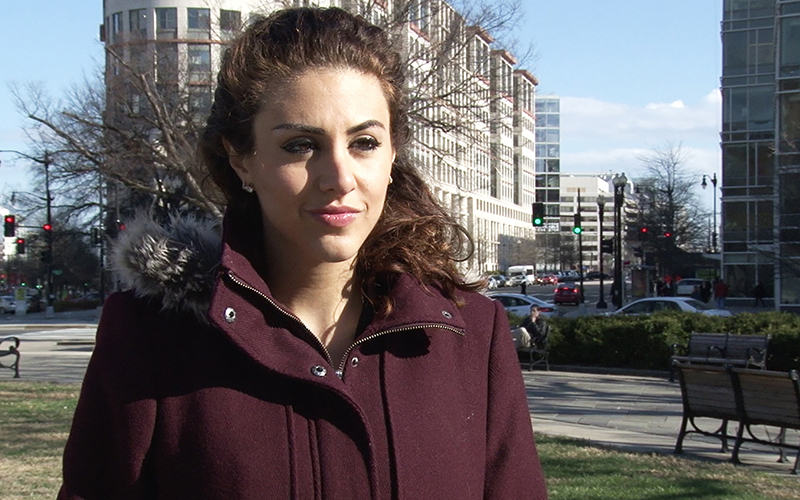
Lena Arkawi, a spokeswoman for American Relief Coalition for Syria, worries about the possible social and economic impacts of President Donald Trump’s ban on refugees. (Photo by Anthony Marroquin/Cronkite News)
WASHINGTON – Jamal Saleh fled violence and police brutality in his native Syria in 2013, resettling in Phoenix with his wife and seven children, but leaving his farm, his beloved hometown, his brother and his sisters back in Syria.
Which is where they may stay, after President Donald Trump signed an executive order Friday to block refugees from entering the U.S. for the next 120 days and bar Syrian refugees indefinitely from coming into the country, according to published reports.
“I’m establishing new vetting measures to keep radical Islamic terrorists out of the United States,” Trump said at the swearing-in of Defense Secretary John Mattis, where he signed the orders. “We don’t want them here.”
It was the latest of a string of executive actions by Trump during his first week in office, fulfilling campaign promises on everything from immigration to federal hiring. Details of the refugee order were reported widely by news media, but the White House had not made copies of the order available to the public as of late Friday night.
But Dan Stein, the president of the Federation for American Immigration Reform, said that based on what he knows of the order, Trump’s refugee action will increase national security.
“We have a right to know who we’re actually letting into our country,” Stein said. He said that in many of the countries that Trump targeted, there is little or no documentation on refugees they are sending to the United States.
Friday’s order will give Trump time to review the country’s current vetting procedures before letting more refugees in, Stein said.
-Cronkite News video by Anthony Marroquin
“It gives Americans a strong sense that there’s a firm hand at the wheel,” Stein said, “that the commander in chief understands that public safety is paramount, and that refugee admissions are a humanitarian program, but they’re optional and they need to serve the public interest as well.”
But critics of the order said that refugees seeking to enter this country are already the “most heavily vetted” group of immigrants.
“It’s a little hard for me to envision what more could be done because they already go through four or five layers of security screening before they are admitted,” said Kathleen Newland, co-founder of the Migration Policy Institute and director of its Refugee and Asylum Policy office.
Newland said many of the countries targeted in Trump’s ban have been designated by the United Nations as having refugees most in need of resettlement.
“It looks as if some of the particular nationalities that have been singled out are from places that people have the greatest need to flee from, and that have in the recent past been acknowledged as in need of resettlement,” Newland said.
Lena Arkawi, a spokeswoman for the American Relief Coalition for Syria, said the route refugees take to America is long and stringent, and it can take up to two years to get fully processed.
Arkawi, who previously worked in Arizona helping resettle Syrian refugees in Glendale, said families must first apply to the UN Refugee Agency, then go through “months after months of interviews,” in which family members are placed in separate rooms and questioned to make sure their stories line up. After that, they are allocated to one of the countries accepting refugees – with no guarantee that country will be the U.S.
She said the program is mainly “people who are civilians looking to better their lives.” The hurdles to get here make them more dedicated to have their children here “focus on their education and make a name for themselves,” she said.
“They have doctors, they have lawyers, they have businesses, they have families of restaurants and really contribute to our American society in such positive ways,” Arkawi said. “So if you remove that and you remove immigrants and you don’t make them feel welcome, you are going to lose a big chunk of what makes America great.”
Saleh, who works at the airport for $10 an hour trying to sustain his family, said life for him is not easy here.
The government provided financial assistance for the first two months, after which he had to get a job, pay the rent, reimburse costs for the flight here – despite the difficulty of getting hired without the ability to speak English.
Saleh said he sometimes wakes up sad because he makes so little and is the only one providing for his family. But he is grateful for the life he lives here, he said, because he and his family are safe, unlike in Syria.
Before arriving in the U.S., the family lived for a year in a refugee camp in Jordan, packed into a tent with little protection from the weather outside. It was hot in the summer and cold at winter. There was no future for his children there, he said, as the education system there was poor.
Now Saleh said he just wants to give his children a peaceful life and give back to the United States in return for the asylum it has given him and his family.
-Cronkite News reporter Anthony Marroquin contributed to this report.